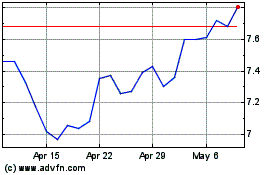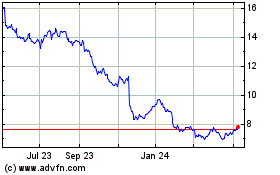By William Boston and Eric Morath
BERLIN--As corporate America debates whether companies should
consider other constituencies than just their shareholders, Germany
offers an example of what a new approach might look like for
labor.
In Germany, where workers enjoy high labor protections and a say
in management decisions, companies such as Volkswagen AG and Bayer
AG have announced plans this year to cut tens of thousands of
jobs.
But rather than resorting to mass layoffs or plant closures,
they will often reach for instruments created by government and
unions that allow executives, often with considerable state
support, to weather economic storms, or reduce their workforces
through voluntary methods.
Yet for influential U.S. CEOs like JPMorgan Chase & Co.'s
James Dimon, who recently vowed to become more stakeholder and less
shareholder focused, Germany isn't just a model. It is also a
cautionary tale. Sparing staff in a short downturn can allow
companies to ramp up activity quickly when demand rebounds without
having to hire and train new workers. But it can also slow
necessary adaptations when companies are faced with structural
changes, resulting in some businesses sticking to outdated business
models for too long, economists and management experts say.
Among the German companies who said this year they will slash
tens of thousands of jobs are auto giant Volkswagen, car parts
suppliers Continental AG and Robert Bosch GmbH, pharmaceutical
company Bayer, electronics group Siemens AG, chemicals maker BASF
AG, and business software maker SAP SE.
However, most of them will use short-time work, early
retirement, and other instruments to reduce their workforce or even
keep staff on with government support rather than axing jobs as
U.S. auto giant General Motors Co. did recently when it decided to
shut five plants in the U.S. and Canada.
"There is a social and cultural view in Germany that is
different than the U.S. but also a system of governance where the
interests of the employee is more in the foreground," said Craig
Smith, chair in ethics and social responsibility at Paris-based
business school Insead.
Volkswagen took action early. In 2016, the company said it would
shed 23,000 administrative and factory jobs in Germany by 2025. Hit
by slower demand in China and Europe, Volkswagen slashed production
in its German factories by 15% in the first half of this year and
announced another 4,000 job cuts. When the restructuring is
completed, Volkswagen will have shed 25% of its German workforce
from its 2017 level.
But it won't resort to forced layoffs. Instead of shutting
factories, Volkswagen is retooling three plants to make electric
cars. And it is shrinking the workforce long term by not replacing
the large numbers of baby boomers who are approaching retirement
age.
Bosch employs 50,000 people world-wide just in diesel components
businesses, 15,000 of them in Germany. Management is negotiating
with the IG Metall trade union to reach an agreement on cutting
staff.
Bosch CEO Volkmar Denner said recently that the company is
"doing everything to do this in a way that is socially
responsible," saying the company would use work time accounts,
severance programs, early retirement, and reducing the ranks of
temporary workers.
Notwithstanding the cultural differences, German managers have
little leeway in how they treat staff. Since the 1970s, by law the
supervisory board of any company with more than 2,000 employees
must be made up of equal numbers of shareholder and labor
representatives, which has given trade unions enormous
decision-making influence.
Many of Germany's biggest corporations have brokered deals with
trade unions to allow them to reduce staff through various
instruments in exchange for agreements to ban forced layoffs.
Bayer, for example, is cutting 12,000 jobs by the end of 2021, but
resorting mainly to voluntary methods such as early retirement and
buyouts that in some cases offer up to five years of severance
pay.
"Such voluntary offers are always expensive because they have to
be attractive, otherwise no one would take them," said Georg
Müller, Bayer's Germany human resources chief.
The upside for Bayer, he said, that it gives the company more
control over managing the staff reductions and reduces the
confrontation between management and workforce, preventing costly
and disruptive strikes.
Alternatives to redundancies and plant closures--which are all
possible under German law but can be slow and costly--have at times
helped companies be more rather than less nimble in reacting to
rapid fluctuations in demand.
In 2009, as Germany's gross domestic product collapsed in the
wake of the Lehman Brothers closure, many companies resorted to
short-time work--sending employees home but keeping them on the
payroll thanks to wage subsidies.
Hours worked per employee declined 3.8%, but when demand
rebounded a year later, they could skip a lengthy hiring and
training process. Despite a 5-point drop in GDP, unemployment rose
less than a percentage point, while in the U.S., it rose to a
postrecession peak of 10% in October 2009 from a prerecession low
of 4.4% in the spring of 2007.
Another tool that has become popular in Germany to manage
capacity is working-time accounts, which are typically negotiated
as part of labor contracts. With these accounts, workers can bank
overtime pay during good economic times and then tap those accounts
when their hours are cut during economic downturns.
But the German way also bears risks.
"If you have a structural change--a business model change--then
short-time work could prolong a crisis by avoiding making the
necessary adjustments," said Enzo Weber, an economist at the
Institute for Employment Research in Nuremberg, Germany.
Another limitation is that socially considerate alternatives to
payroll cuts work best in deep and short downturns but can prove
excessively costly--to companies or to the state--in shallow,
protracted slumps when capacity needs to be durably reduced.
"The institutions are set up to create even more flexibility" to
retain workers during slowdowns, said Gunther Friedl, dean of the
Technische Universität München School of Management in Munich. "The
risk is if you keep too many people, and the losses pile up to the
point of no return, that could result in bankruptcies."
Germany's finance minister hinted last month that it had a war
chest of EUR55 billion ($61 billion) to inject into the economy to
buffer the effects of a downturn.
German GDP shrunk in the second quarter and the country's
central bank warned in its most recent monthly report that the
country may already be in a recession. How long it could last is
anyone's guess. There is no sign or a resolution to the global
trade disputes and the slowdown in China that are weighing on
global demand--a particular concern for an economy that is highly
dependent on exports.
"Businesses should be preparing for a recession the next one to
two years," Mr. Friedl said. "Depending on trade fights, it could
be more or less severe."
Ruth Bender
in Berlin contributed to this article.
Write to William Boston at william.boston@wsj.com and Eric
Morath at eric.morath@wsj.com
(END) Dow Jones Newswires
September 09, 2019 05:44 ET (09:44 GMT)
Copyright (c) 2019 Dow Jones & Company, Inc.
Bayer Aktiengesellschaft (PK) (USOTC:BAYRY)
Historical Stock Chart
From Mar 2024 to Apr 2024

Bayer Aktiengesellschaft (PK) (USOTC:BAYRY)
Historical Stock Chart
From Apr 2023 to Apr 2024
